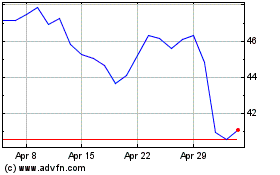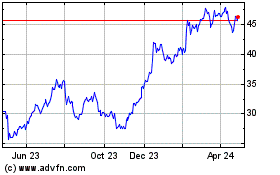Private-Equity Numbers Aren't as Ugly as They Appear -- Heard on the Street
May 05 2020 - 7:29AM
Dow Jones News
By Telis Demos
Private-equity firms have put up some ugly numbers in earnings
reports so far. Investors should look past them.
Apollo Global Management, Blackstone Group and Carlyle Group all
reported huge net losses in the first quarter -- more than $5
billion collectively. Those losses were mainly driven by declines
in marks of the on-paper value of their myriad investments. That
performance over the long run is what eventually determines the
value of these firms. If they can't ultimately realize gains on
their investments they earn less, can't fundraise and don't
generate fees.
In the meantime however, these big private-equity firms are
continuing to generate substantial management fees that represent
actual money in the pockets of the firms and, via potential future
dividends, investors. While declines in asset values do affect the
base on which management fees are generated, there are substantial
offsets to that for now.
For one, the firms have ample "dry powder," or uninvested
capital, more than $250 billion between the three firms. That means
they can keep putting money to work to earn fees on. The firms'
deals with limited partners also can offset the impact of
mark-to-market declines on fees; Apollo's fee-generating assets
under management declined just 2% from the prior quarter, versus a
5% decline in total assets.
As for their investment performance, the numbers in the first
quarter certainly weren't pretty. But in the context of what the
broader market has done, they aren't outsize so far. Blackstone and
Apollo both reported 21.6% declines in their corporate
private-equity portfolios in the first quarter. That was about the
same as the S&P 500, which was down 20% in the first quarter.
And their other classes of investments, such as corporate credit
and real estate, were down far less than the S&P 500.
There are some relevant caveats, too. For example, energy was
responsible for the bulk of Blackstone's corporate private-equity
decline. But much of the firm's energy-portfolio investments sit in
dedicated energy funds, which means that the broader
limited-partner base isn't exposed to losses in the sector.
The biggest hit to distributable earnings will be from realizing
investments. It will be harder to sell assets, like taking a
private company public, in this market. But the decline in firms'
share prices already reflects this. Over the past three months,
Apollo shares are down 15%, Blackstone's are down 22% and Carlyle's
are off by 34%.
What investors should be considering now is whether returns on
new investments can make up for any permanent impairment of
existing ones. Times of distress are when private equity has
historically shined.
The median annual returns on funds raised in 2009 were 13.9%,
versus 8.1% on 2006 funds, according to consulting and advisory
firm EY. EY also noted that private-equity acquisitions fell by 80%
from 2007 to 2009, meaning some funds didn't take full advantage of
distressed prices. This time, by contrast, large private-equity
firms are already making new investments. Apollo, for example, made
$40 billion in gross purchases in the first quarter, mostly in
March, and $10 billion more in April alone. It helps that the big
firms are so stocked with dry powder.
One challenge may be that prices and liquidity have rebounded so
aggressively, the window for distress bets quickly narrowed.
Further waves of distress would again hit portfolio companies'
valuations -- but it would also create more offsetting
opportunities.
(END) Dow Jones Newswires
May 05, 2020 07:14 ET (11:14 GMT)
Copyright (c) 2020 Dow Jones & Company, Inc.
Carlyle (NASDAQ:CG)
Historical Stock Chart
From Jun 2024 to Jul 2024

Carlyle (NASDAQ:CG)
Historical Stock Chart
From Jul 2023 to Jul 2024
